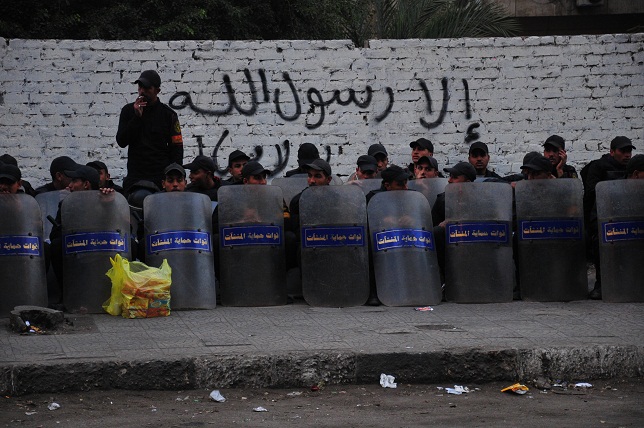
“It is a scenario everybody has become bored with for its repetitiveness. Football in Egypt has returned as an empty theater show for the sake of the Egyptian police, as if the decisions of the Egyptian security [apparatus] are revelations from above, even if it does not mean a thing but their inability to perform their job.”
The preceding lines are a translation of a statement issued by a group of Egyptian Ultras groups on 9 March, most notably Ultras Ahlawy (UA) and Ultras White Knights (UWK), Egypt’s two largest Ultras groups who back Al-Ahly SC and Zamalek SC respectively.
On 20 February, UA were celebrating their team’s clinching the African Super Cup, when suddenly clashes broke out between the fans and police forces in Cairo Stadium’s north curve, as policeman, in a provocative action, started to pull the group’s banner (a group’s banner is a very important concept in Ultras mentality and its loss means the dissolution of the group) after the fans chanted against former interior minister, currently imprisoned, Habib Al-Adly.
According to the interior ministry, 25 police personnel were injured in the clashes where police used teargas and birdshot for the first time inside a stadium. An unannounced number of fans were injured and several were arrested, yet none were charged by prosecution and were released days after.
Zamalek fans also had their share before their match with Angolan side Kabuscorp in the African Champions League.
On 1 March, police forces attacked UWK when they gathered near Cairo Stadium, after an interior ministry statement said that the ministry feared for supporters’ lives and had information that infiltrators would join them and threaten their safety if they attended the match. The ministry then decided to hold the match behind closed doors and threaten the safety of fans outside the stadium by themselves, by attacking them with teargas and birdshot.
Seven Ultras groups issued the aforementioned statement demanding that the ministry not take part in securing football matches, and that the process should be done by private security companies (clubs in Europe mainly hire companies to do so) or by themselves.
Hours later, interior ministry spokesman Hany Abdel Latif told Al-Nahar Sports Channel that his ministry approved of the demand, and would not secure football matches starting next season.
The statement and the ministry decision caused a stir in sports media. One of the most watched sports media watched anchors is Ahmed Shobeir, a former Al-Ahly and Egypt goalkeeper who participated in Egypt’s last World Cup qualification and the tournament itself in 1990, as well as a former National Democratic Party member who showed loyalty to SCAF after February 2011 and praised the Muslim Brotherhood’s Youth Minister Osama Yassin in the first six months of Mohamed Morsi’s government. Now, as expected, he is a strong supporter of the current regime; Shobeir mocked the Ultras’ demand and expected further violence to come in football stadia.
“Violent” is the newest in the list of Shobeir’s labels of the Ultras movement since he dedicated to use his show against them. Before the revolution the labels were “atheists” and “drug addicts”; after the revolution they were “funded by Gamal Mubarak to distract youth from politics” ; and after the ouster of former president Mohamed Morsi, they were “Brotherhood-infiltrated” and “Bought out by the Brotherhood”.
On 14 March, you may have noticed a tweet from a news service on your Twitter timeline “Al-Ahly defeats Zamalek 27-23 in handball league”, you resume scrolling without reading the full news.
In Abdallah Al-Faisal court inside Al-Ahly club in Al-Gezira district, both fan groups, UA and UWK witnessed the Cairo handball derby from the stands; no violence took place between the arch-rivals. The reason: no policemen were around.
It is well-proven that any circle that hosts an ultras group and police becomes a circle of violence, especially after 72 UA members were killed in Port Said stadium on 1 February, 2012: the Port Said massacre. Several policemen were charged with negligence and the then-director of Port Said security Essam Samak was handed a 15 year sentence.
It is also becoming clear that the current regime (and the upcoming one as a matter of fact) has a problem with youth, looking to repress them through different ways. Those who protest will be punished by the Protest Law, while those who love football will be banned from attending its games and labeled as Brotherhood if police attacks them. They will have to suffer a worsening educational system and unemployment, and if they are lucky enough and leave the country they might be asked to give a one-month salary to the poor in Egypt.
The interior ministry’s decision is a shift-away from this policy. Is it an honest gesture or just a trick to prove a point that Ultras are violent and self-destructive? I really want to be proven wrong, but I do not expect that I will.


